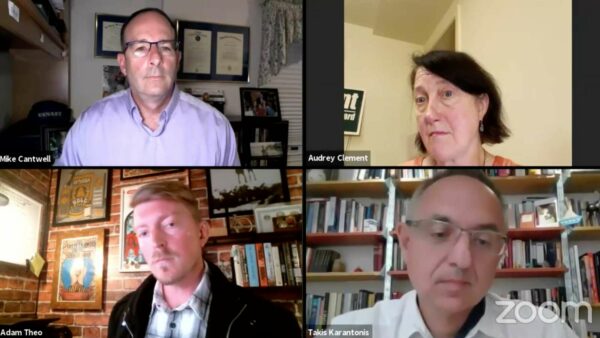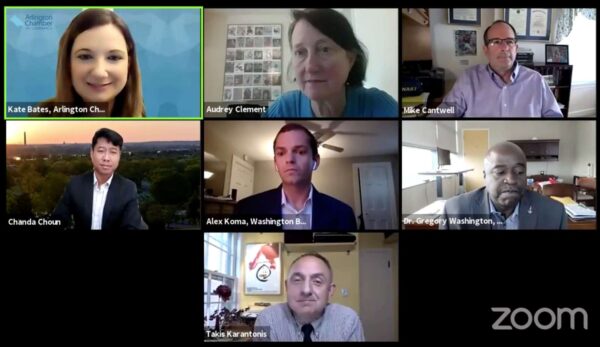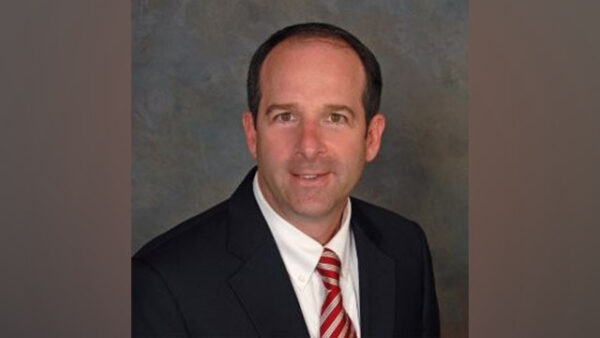
Ranked-choice voting is supported by all four candidates for County Board, according to their comments at an Arlington Committee of 100 candidate forum held last night (Wednesday).
The event was the first candidate forum of the fall general election season.
Support is strong among the three independent candidates — Audrey Clement, Mike Cantwell and Adam Theo — who want to unseat Democrat incumbent Takis Karantonis. He won a special election in 2020 and his seat is now up for a full four-year term. Theo, a Libertarian, is the most recent addition to the ballot after officially launching his campaign this week.
While all four support ranked choice voting, the reform would not be ready for the upcoming Nov. 2 election, as the county is still hammering out the logistics of the system. Dismayed at the pace of implementation, the independents said the reform would reveal public support for candidates like them and add political diversity to the County Board.
“I’ve spent a lot of my free time promoting ranked choice voting in Virginia,” said Cantwell, who became the vice president of Fair Vote Virginia, which advocates for ranked choice voting in Virginia, in 2019. “I went to Richmond in February 2020 and lobbied to bring it to Virginia. At that time, to the surprise of many, the legislature passed bills 506 and 1103, which allowed it in [Arlington] and the rest of Virginia. Since that time, [the county has] taken very little action to implement that new law.”
Theo also criticized the lack of movement on implementing the new voting system and educating voters about it.
“It would’ve been awesome to have the logo-picking determined by ranked choice voting,” he said. “That would’ve been a great way to educate the public. Here we are, waiting for the county to proceed and provide results. I have a lot of skepticism for the County Board’s real willingness to push forward real reform. It puts their own positions, jobs, in jeopardy.”
Karantonis said he is on the record supporting ranked-choice voting and voted to fund an initiative to test it out.
“I put money where my mouth is,” he said. “I think this is a great improvement in democracy.”
During the forum the four candidates articulated their positions housing and on Arlington County’s goal of carbon neutrality by 2050. Both Karantonis and Theo said “affordable housing” is the biggest issue facing Arlington.
“I’ve been a housing advocate from day one,” Karantonis said. “The first thing my wife and I experienced [when moving here] was not being able to find housing, not having choices… Arlington is a community that looks back to a solid record of planning carefully for housing, of matching development with assets like transportation, schools and natural resources. We need to bundle these to support the creation of new housing choices because displacement is a real thing.”
Theo agreed.
“[Housing affordability] poses the problem of pricing out the elderly, low-income, immigrant and disabled people who are clinging on as it is already,” he said. “The number of housing units built in this county is horrifyingly low.”
But he took a jab at the County Board for talking about affordable housing and posing for photos at new developments, while not doing more to prioritize affordability. He spoke favorably of the Missing Middle Housing Study, a county-led effort to see if single-family home areas should be rezoned for more types of moderate-density homes, as a means to increase housing options for the middle-class.
Cantwell said he worries about affordability both in terms of housing and taxes.
“I think the biggest problem facing Arlington is runaway spending and taxes and lack of accountability in county government, [which] stems from lack of political competition,” Cantwell said. “I’m for affordable housing, but I question the outcomes of $300 million spent on a government-run affordable housing program… I think most Arlingtonians are interested in finding a market rate affordable housing place to live in, but not that many are interested in being part of government run program, where they have to submit tax returns, W-2s [and other] bureaucracy.”
Clement said the Missing Middle Study will create more housing, but nothing truly affordable, predicting people will continue to get priced out of their neighborhoods. She added that it won’t promote racial equity, citing a study from New York University that found between 2000-2007, upzoning in New York City “produced an influx of whites in gentrified areas, even as white population plummeted.”
“A far better solution is to repurpose unrented luxury units in the Rosslyn-Ballston corridor to moderate income housing,” she said.
(Another NYU study found little link between neighborhood gentrification and displacement of low-income residents, at least in New York City.)



